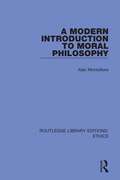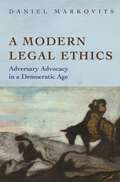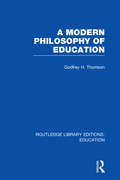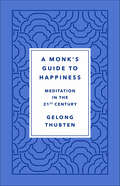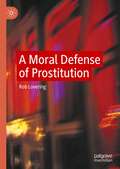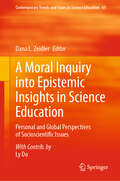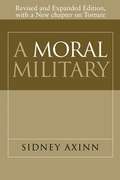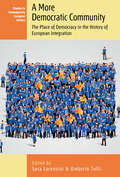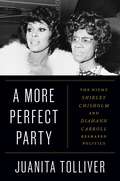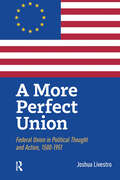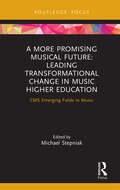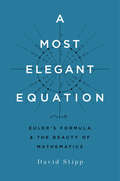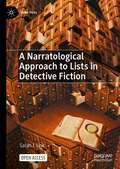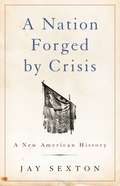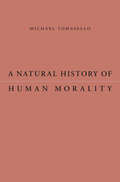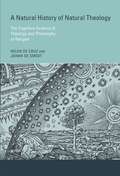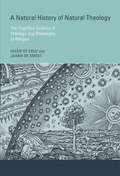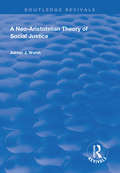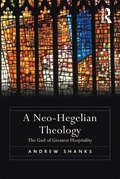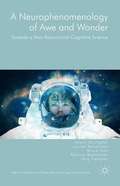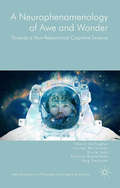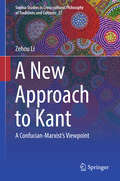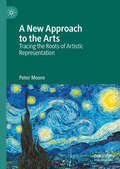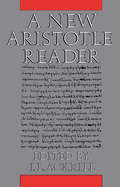- Table View
- List View
A Modern Introduction to Moral Philosophy
by Alan MontefioreOriginally published in 1958, this book shows how a systematic consideration of what exactly may be meant by calling anything ‘good’, inevitably leads on to the more general and fundamental problem of the relations between value-judgments and statements of fact. It does on to explain some of the difficult and far-reaching issues which this problem involves. The book is intended as an introduction for students interested in finding out the nature and point of modern methods of philosophic analysis when applied to problems of moral philosophy.
A Modern Legal Ethics: Adversary Advocacy in a Democratic Age
by Daniel MarkovitsA Modern Legal Ethics proposes a wholesale renovation of legal ethics, one that contributes to ethical thought generally. Daniel Markovits reinterprets the positive law governing lawyers to identify fidelity as its organizing ideal. Unlike ordinary loyalty, fidelity requires lawyers to repress their personal judgments concerning the truth and justice of their clients' claims. Next, the book asks what it is like--not psychologically but ethically--to practice law subject to the self-effacement that fidelity demands. Fidelity requires lawyers to lie and to cheat on behalf of their clients. However, an ethically profound interest in integrity gives lawyers reason to resist this characterization of their conduct. Any legal ethics adequate to the complexity of lawyers' lived experience must address the moral dilemmas immanent in this tension. The dominant approaches to legal ethics cannot. Finally, A Modern Legal Ethics reintegrates legal ethics into political philosophy in a fashion commensurate to lawyers' central place in political practice. Lawyerly fidelity supports the authority of adjudication and thus the broader project of political legitimacy. Throughout, the book rejects the casuistry that dominates contemporary applied ethics in favor of an interpretive method that may be mimicked in other areas. Moreover, because lawyers practice at the hinge of modern morals and politics, the book's interpretive insights identify--in an unusually pure and intense form--the moral and political conditions of all modernity.
A Modern Philosophy of Education (Routledge Library Editions: Education)
by Godfrey Thomson‘Philosophy’ in the context of this book means that the author is looking at education as a whole, without restrictions or simplifications; looking at ends and purposes, not merely at methods and means. He discusses early years education, the sociology and psychology of education as well as education in adolescence and adult education. Well-known as a critical pioneer of intelligence research the author discusses educational psychology as much as philosophy in this book.
A Monk's Guide to Happiness: Meditation in the 21st Century
by Gelong Thubten“Thubten is able to explain meditation using clear language and an approach which really speaks to our modern tech-infused lives.” —Rami Jawhar, Program Manager at Google Arts & CultureIn our never-ending search for happiness we often find ourselves looking to external things for fulfillment, thinking that happiness can be unlocked by buying a bigger house, getting the next promotion, or building a perfect family.In this profound and inspiring book, Gelong Thubten shares a practical and sustainable approach to happiness. Thubten, a Buddhist monk and meditation expert who has worked with everyone from school kids to Silicon Valley entrepreneurs and Benedict Cumberbatch, explains how meditation and mindfulness can create a direct path to happiness.A Monk’s Guide to Happiness explores the nature of happiness and helps bust the myth that our lives and minds are too busy for meditation. The book can show you how to:Learn practical methods to help you choose happinessDevelop greater compassion for yourself and othersLearn to meditate in micro-moments during a busy dayDiscover that you are naturally ‘hard-wired’ for happinessReading A Monk’s Guide to Happiness could revolutionize your relationship with your thoughts and emotions, and help you create a life of true happiness and contentment.“His writing is full of inspiration but also the pragmatism needed to form a sustainable practice. His book clearly illustrates why we all need meditation and mindfulness in our lives.” —Benedict Cumberbatch“[A] powerful debut . . . a highly accessible and jargon-free introduction to meditation.” —Publishers Weekly
A Moral Defense of Prostitution
by Rob LoveringIs prostitution immoral? In this book, Rob Lovering argues that it is not. Offering a careful and thorough critique of the many—twenty, to be exact—arguments for prostitution's immorality, Lovering leaves no claim unchallenged. Drawing on the relevant literature along with his own creative thinking, Lovering offers a clear and reasoned moral defense of the world's oldest profession. Lovering demonstrates convincingly, on both consequentialist and nonconsequentialist grounds, that there is nothing immoral about prostitution between consenting adults. The legal implications of this view are also brought to bear on the current discourse surrounding this controversial topic.
A Moral Inquiry into Epistemic Insights in Science Education: Personal and Global Perspectives of Socioscientific Issues (Contemporary Trends and Issues in Science Education #61)
by Ly DoThis edited volume reveals a reflective culmination of the Socioscientific Issues (SSI) framework that examines past, present, and future trends along with advances in the field of science education. It presents, for the first time, what the precursors and nascent features of the framework entailed and examines the underlying presuppositions that have guided this research program as it matured into present day conceptualizations and cutting-edge advances of the SSI framework along with implications for the future. More precisely, the volume examines what the impetus was for the factors preceding the framework, how it came to be formalized into a conceptual and theoretical framework, the philosophical, sociological, and psychological underpinnings of the framework, its role with respect to moral education in the context of science education, and what it means to pursue moral inquiry and epistemic insight in the practice of science teaching and learning through SSI. It offers global insights and perspectives of trends related to SSI from 40 scholars representing 16 nations.
A Moral Military, Revised and Expanded Edition
by Sidney AxinnShould a good soldier ever disobey a direct military order? Are there restrictions on how we fight a war? What is meant by 'military honor', and does it really affect the contemporary soldier? Is human dignity possible under battlefield conditions? Sidney Axinn considers these basic ethical questions within the context of the laws of warfare and answers 'yes' to each of these questions. In this study of the conduct of war, he examines actions that are honorable or dishonorable and provides the first full-length treatment of the military conventions from a philosophical point of view. Axinn gives a philosophical analysis of the 'Laws of Warfare' as found in the Hague and Geneva Conventions, which have been agreed to by almost every nation in the world. The aims of his study are to establish a basic twentieth-century framework for moral military action and to assist military personnel in analyzing their won professional ethic.Stating that moral reasoning is required by people in military uniform in a wide variety of situations, the author examines the question of the limits of military obedience. Axinn argues for the seriousness of the concept of military honor but limits honorable military activity by a strict interpretation of the notion of war crime. Major chapters deal with military honor, prisoners of war, spying, war crimes, the dirty-hands theory of command, nuclear weapons, terrorism, and covert operations. This philosophical study of the line between honorable and dishonorable military action cautions that in compliance with the war conventions professional military personnel and knowledgeable civilians must not lose their moral nerve nor abandon honor to satisfy immoral political requests. Author note: Sidney Axinn is Professor of Philosophy at Temple University.
A More Democratic Community: The Place of Democracy in the HIstory of European Integration (Studies in Contemporary European History #29)
by Sara Lorenzini Umberto TulliThe histories of European unification and of West European democracy during the second half of the twentieth century have often been considered as separate or even antagonistic processes with the institutions of European integration being regarded as bastions of bureaucratic rule. A More Democratic Community challenges this assumption and argues that European integration benefited from the democratic accountability of member states while contributing to the validation of national democratic institutions. However, it also unveils a paradox: as integration deepened, it diminished the power of national parliaments, sparking a democratic accountability crisis within the Community.
A More Perfect Party: The Night Shirley Chisholm and Diahann Carroll Reshaped Politics
by Juanita TolliverFrom an MSNBC Political Analyst, a riveting account of the legendary party hosted by Diahann Carroll for Shirley Chisholm's 1972 presidential campaign, which changed the playing field for Black women in politics. Joy-Ann Reid calls A More Perfect Party, "a beautifully written political-social page turner." In 1972, New York Representative Shirley Chisholm broke the ice in American politics when she became the first Black woman to run for president of the United States. Chisholm left behind a coalition-building model personified by a once-in-an-era Hollywood party hosted by legendary actress and singer Diahann Carroll, and attended by the likes of Huey P. Newton, Barbara Lee, Berry Gordy, David Frost, Flip Wilson, Goldie Hawn and others. In A More Perfect Party, MSNBC political analyst Juanita Tolliver presents a path to people-centered politics through the lens of this soiree, with surprising parallels to our current electoral reality. Chisholm worked the crowd of movie stars, media moguls, music executives and activists gathered at Carroll&’s opulent Beverly Hills home, forging relationships with laughter as she urged guests to unify behind her campaign. With the feminist movement on the rise and eighteen- to twenty-year-olds voting for the first time in American history, the Democratic Party and the nation were on the cusp of long-overdue change. Zooming in on one party attendee per chapter, A More Perfect Party brings this whimsical event out of the margins of history to demonstrate that there is an opportunity for all of us to fight for a better nation and return power to the people.
A More Perfect Union: Federal Union in Political Theory and Practice, 1500-1951
by Joshua LivestroThis book tells the history of the 'federal union', a concept that may be traced from the early Renaissance to the establishment of the European Coal and Steel Community (1951), the predecessor of today's European Union. It is a story of three federal canons: of greater and lesser thinkers, of utopian peace plans, and of practical experiences with federal unions. Together they shaped the concepts that created the ECSC. This book unlocks the past of the EU, a union that always thought it didn't have a past, but was, on the contrary, 'sui generis', without examples or predecessors. Although there was nothing inevitable about the founding of the EU, A More Perfect Union shows that it was plausible and perhaps even predictable that such a union would be formed at some point, and that the aftermath of the Second World War was exactly the kind of founding moment about which federal theorists in previous centuries had speculated.
A More Promising Musical Future: CMS Emerging Fields in Music (CMS Emerging Fields in Music)
by Michael StepniakToday’s higher education music faculty and administrators are faced with extraordinary pressure to adapt, innovate, and change. But what change is most critical to pursue – and how can it be brought about effectively? This concise volume brings together four seasoned thought leaders with distinct voices, each providing a complementary glimpse into how music faculty and administrators can help lead changes that truly matter. Making the case for transformations to better align music training in higher education with our culturally diverse society and the actual marketplace facing graduates, the perspectives collected here provide essential change management leadership strategies for music departments in the 21st century. Covering topics such as diversity and inclusion, institutional transformation, and preparing students for contemporary music careers, each chapter includes an outline of specific steps that can be taken individually and collectively towards needed change. Illuminating issues and providing practical suggestions, this book will enable both music faculty and administrators to confidently navigate change together with their communities.
A Most Elegant Equation: Euler's Formula and the Beauty of Mathematics
by David StippAn award-winning science writer introduces us to mathematics using the extraordinary equation that unites five of mathematics' most important numbersBertrand Russell wrote that mathematics can exalt "as surely as poetry." This is especially true of one equation: ei(pi) + 1 = 0, the brainchild of Leonhard Euler, the Mozart of mathematics. More than two centuries after Euler's death, it is still regarded as a conceptual diamond of unsurpassed beauty. Called Euler's identity or God's equation, it includes just five numbers but represents an astonishing revelation of hidden connections. It ties together everything from basic arithmetic to compound interest, the circumference of a circle, trigonometry, calculus, and even infinity. In David Stipp's hands, Euler's identity formula becomes a contemplative stroll through the glories of mathematics. The result is an ode to this magical field.
A Narratological Approach to Lists in Detective Fiction (Crime Files)
by Sarah J. LinkThis open access book examines how the form of the list features as a tool for meaning-making in the genre of detective fiction from the nineteenth to the twenty-first century. The book analyzes how both readers and detectives rely on listing as an ordering and structuring tool, and highlights the crucial role that lists assume in the reading process. It extends the boundaries of an emerging field dedicated to the study of lists in literature and caters to a newly revived interest in form and New Formalist approaches in narratological research. The central aim of this book is to show how detective fiction makes use of lists in order to frame various conceptions of knowledge. The frames created by these lists are crucial to decoding the texts, and they can be used to demonstrate how readers can be engaged in the act of detection or manipulated into accepting certain propositions in the text.
A Nation Forged by Crisis: A New American History
by Jay SextonA concise new history of the United States revealing that crises--not unlike those of the present day--have determined our nation's course from the startIn A Nation Forged by Crisis, historian Jay Sexton contends that our national narrative is not one of halting yet inevitable progress, but of repeated disruptions brought about by shifts in the international system. Sexton shows that the American Revolution was a consequence of the increasing integration of the British and American economies; that a necessary precondition for the Civil War was the absence, for the first time in decades, of foreign threats; and that we cannot understand the New Deal without examining the role of European immigrants and their offspring in transforming the Democratic Party. A necessary corrective to conventional narratives of American history, A Nation Forged by Crisis argues that we can only prepare for our unpredictable future by first acknowledging the contingencies of our collective past.
A Nation of Shopkeepers: The Unstoppable Rise of the Petite Bourgeoisie
by Dan EvansA Nation of Shopkeepers explores the unstoppable rise of the petite-bourgeoisie, one of the most powerful, but underexplored, classes in modern society.The petite-bourgeoisie — the insecure class between the working class and the bourgeoisie — is hugely significant within global politics. Yet it remains something of a mystery.Initially identified as a powerful political force by theorists like Marx and Poulantzas, the petit-bourgeoisie was expected to decline, as small businesses and small property were gradually swallowed up by monopoly capitalism. Yet, far from disappearing, structural changes to the global economy under neoliberalism have instead grown the petite-bourgeoisie, and the individualist values associated with it have been popularized by a society which fetishizes "aspiration", home ownership and entrepreneurship. So why has this happened?A Nation of Shopkeepers sheds a light on this mysterious class, exploring the class structure of contemporary Britain and the growth of the petite-bourgeoisie following Thatcherism. It shows how the rise of home ownership, small landlordism and radical changes to the world of work have increasingly inculcated values of petite-bourgeois individualism; how popular culture has promoted and reproduced values of aspiration and conspicuous consumption that militate against socialist organizing; and, most importantly, what the unstoppable rise of the petit-bourgeoisie means for the left.
A Natural History of Human Morality
by Michael TomaselloMichael Tomasello offers the most detailed account to date of the evolution of human moral psychology. Based on experimental data comparing great apes and human children, he reconstructs two key evolutionary steps whereby early humans gradually became an ultra-cooperative and, eventually, a moral species capable of acting as a plural agent "we".
A Natural History of Natural Theology
by Johan De Smedt Helen De CruzQuestions about the existence and attributes of God form the subject matter of natural theology, which seeks to gain knowledge of the divine by relying on reason and experience of the world. Arguments in natural theology rely largely on intuitions and inferences that seem natural to us, occurring spontaneously -- at the sight of a beautiful landscape, perhaps, or in wonderment at the complexity of the cosmos -- even to a nonphilosopher. In this book, Helen De Cruz and Johan De Smedt examine the cognitive origins of arguments in natural theology. They find that although natural theological arguments can be very sophisticated, they are rooted in everyday intuitions about purpose, causation, agency, and morality. Using evidence and theories from disciplines including the cognitive science of religion, evolutionary ethics, evolutionary aesthetics, and the cognitive science of testimony, they show that these intuitions emerge early in development and are a stable part of human cognition.De Cruz and De Smedt analyze the cognitive underpinnings of five well-known arguments for the existence of God: the argument from design, the cosmological argument, the moral argument, the argument from beauty, and the argument from miracles. Finally, they consider whether the cognitive origins of these natural theological arguments should affect their rationality.
A Natural History of Natural Theology: The Cognitive Science of Theology and Philosophy of Religion (The\mit Press Ser.)
by Johan De Smedt Helen De CruzAn examination of the cognitive foundations of intuitions about the existence and attributes of God.Questions about the existence and attributes of God form the subject matter of natural theology, which seeks to gain knowledge of the divine by relying on reason and experience of the world. Arguments in natural theology rely largely on intuitions and inferences that seem natural to us, occurring spontaneously—at the sight of a beautiful landscape, perhaps, or in wonderment at the complexity of the cosmos—even to a nonphilosopher. In this book, Helen De Cruz and Johan De Smedt examine the cognitive origins of arguments in natural theology. They find that although natural theological arguments can be very sophisticated, they are rooted in everyday intuitions about purpose, causation, agency, and morality. Using evidence and theories from disciplines including the cognitive science of religion, evolutionary ethics, evolutionary aesthetics, and the cognitive science of testimony, they show that these intuitions emerge early in development and are a stable part of human cognition.De Cruz and De Smedt analyze the cognitive underpinnings of five well-known arguments for the existence of God: the argument from design, the cosmological argument, the moral argument, the argument from beauty, and the argument from miracles. Finally, they consider whether the cognitive origins of these natural theological arguments should affect their rationality.
A Neo-Aristotelian Theory of Social Justice (Routledge Revivals)
by Adrian J. WalshFirst published in 1997. Adrian Walsh develops an original account of social justice using neo-Aristotelian value theory. At the heart of the book is an account of the human good in which human interests are divided into three main categories: the basal interests, the eudaimonian interests and the interests in subjectivity. Subsequently, the distributive goods, to which distributive principles are to apply, are divided into three main spheres; the basal sphere, the eudaimonian sphere and the sphere of subjectivity. While the overall orientation of the project is egalitarian, different distributive principles are applied in each of the three spheres, with the intention ultimately of realising the egalitarian ideal. The main feature of the book is the development of a pluralist egalitarian theory of social justice using a distinctive account of the human good.
A Neo-Hegelian Theology: The God of Greatest Hospitality
by Andrew ShanksThe thought of G.W.F. Hegel (1770-1831) haunts the world of theology. Constantly misunderstood, and often maliciously misrepresented, Hegel nevertheless will not go away. Perhaps no other thinker in Christian tradition has more radically sought to think through the requirements of perfect open-mindedness, identified as the very essence of the truly sacred. This book is not simply an interpretation of Hegel. Rather, it belongs to an attempt, so far as possible, to re-do for today something comparable to what Hegel did for his day. Divine revelation is on-going: never before has any generation been as well positioned as we are now, potentially to comprehend the deepest truth of the gospel. So Hegel argued, of his own day. And so this book also argues, of today. It is an attempt to indicate, in Trinitarian form, the most fundamentally significant ways in which that is the case. Thus, it opens towards a systematic understanding of the history of Christian truth, essentially as an ever-expanding medium for the authentic divine spirit of openness.
A Neurophenomenology of Awe and Wonder: Towards a Non-Reductionist Cognitive Science (New Directions In Philosophy And Cognitive Science)
by Shaun Gallagher Lauren Reinerman-Jones Bruce Janz Patricia Bockelman Jörg TremplerA Neurophenomenology of Awe and Wonder
A Neurophenomenology of Awe and Wonder: Towards a Non-Reductionist Cognitive Science (New Directions in Philosophy and Cognitive Science)
by Shaun Gallagher Bruce Janz Patricia Bockelman Jörg Trempler Lauren ReinermanThis book presents a study of the various feelings of awe and wonder experienced by astronauts during space flight. It summarizes the results of two experimental, interdisciplinary studies that employ methods from neuroscience, psychology, phenomenology and simulation technology, and it argues for a non-reductionist approach to cognitive science.
A New Approach to Kant: A Confucian-marxist's Viewpoint (Sophia Studies in Cross-cultural Philosophy of Traditions and Cultures #27)
by Zehou LiOriginally written during the Cultural Revolution, this book introduces and interprets Kant’s critical philosophy through the lens of its author Li Zehou’s own philosophical approach: anthropological historical ontology. Li argues that the process of human development begins with and is shaped by the practical material activities associated with making and using tools in primitive societies. Over millions of years, these ever-evolving practices accumulate and become sedimented into archetypical forms that shape history, social relationships, and human psychology. Li’s views draw upon Marx’s theory of practice and, as those familiar with his work will recognize, his reinterpretation of Confucian thought with its emphasis on material life and worldly existence. Beginning with the assumption that the question at heart of Kant’s philosophy is “What is the human being?” Li offers a highly original answer by arguing that the root of Kant’s “transcendental” knowledge, universal forms, moral autonomy, and aesthetics can be found in the practical and social activities associated with tool-making. Li offers a new reading not only of Kant but of modern European philosophy, including Hegel and Marx, that forces us to rethink our understanding of the relation between individuals and communities and challenges us to ask ourselves how we can best achieve both harmony and freedom in our shared human future.
A New Approach to the Arts: Tracing the Roots of Artistic Representation
by Peter MooreThis book considers how art actually works, how the various art forms connect with the world of ordinary human experience. Many books approach the subject from the top down, through topics such as the nature of beauty, the meaning of art, aesthetic judgement, and so on. The present book examines the subject from the ground up, so to speak, showing how the creation and appreciation of art spring from innate human needs and capacities. What we call ‘the arts’ emerge organically from the habitual activities through which human beings represent the world to themselves and others. Artistic representation, always more than mere imitation, is a reaching for the spirit of a subject, a revealing of the implicit, a refreshing of the overly familiar. A key idea is that art is representation through convention – that artistic conventions, far from inhibiting the work of the artist, are vital to artistic creativity.
A New Aristotle Reader
by J. L. AckrillIn a single volume that will be of service to philosophy students of all levels and to their teachers, this reader provides modern, accurate translations of the texts necessary for a careful study of most aspects of Aristotle's philosophy. In selecting the texts Professor J. L. Ackrill has drawn on his broad experience of teaching graduate classes, and his choice reflects issues of current philosophical interest as well as the perennial themes. Only recent translations which achieve a high level of accuracy have been chosen; the aim is to place the Greekless reader, as nearly as possible, in the position of a reader of Greek. As an aid to study, Professor Ackrill supplies a valuable guide to the key topics covered. The guide gives references to the works or passages contained in the reader, and indication of their interrelations, and current bibliography.
